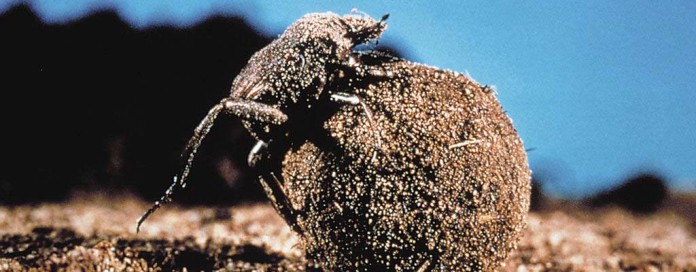
Known as the “Farmers Friend,” the dung beetle returns fresh cattle dung pads back to the earth, building soil and recycling nutrients.
Dung beetles return over 90 percent of the nitrogen in cattle dung back to the soil, which then improves the forage uptake of valuable minerals, phosphorus and sulphur by 80 percent, saving the farmer money on unnecessary fertilizer.
The tunneling action of dung beetles improves plant root development, forage production, and the soil’s water infiltration capacity, resulting in less water runoff and pollution loading in a watershed.
Restoring nutrients
The amazing adult dung beetle can bury 250 times its own weight in dung in a single night at a rate as high as 3.3 pounds every two hours. Considering that a 1,200-pound cow can produce 4.4 tons of manure per year, one can see the importance of dung beetles. This amount of dung contains about 176 pounds of nitrogen, 44 pounds of phosphate, and 198 pounds of potassium.
Since most livestock prefer grazing on dung-free pastures, grazing livestock requires a large area. The presence of dung beetles in a pasture can increase the capacity of a grazing operation.
Beetle babies
Adult dung beetles lay their eggs in dung balls they create for this purpose. The dung beetle buries the balls in as little as six inches or as much as three feet of soil. When the eggs hatch, the larvae feed on the dung ball, leaving behind nutrient-rich organic matter consumed by soil microbes, fungi, and bacteria, commonly known as humus.
Adult dung beetles feed on fresh cattle dung, sucking up the valuable nutritious moisture leaving no trace behind except a little fiber. In fact, most livestock in rotational grazing systems will continue to graze just as though they were rotated to a new field.
Healthy pastures
In addition to providing nutrients needed by soil microorganisms like mycorrhiza fungi, dung beetles improve carbon flow and biological activity in the soil. This may speed up photosynthesis and raise a plant’s sugar content, increasing the Brix level and strengthening a plant’s immune system by facilitating the plants ability to use trace elements from soil microbes. Healthier plants mean healthier pastures, growing from a foundation of healthier soils.
Healthy animals
Dung beetles may also benefit animal health because they serve as a great biological control of flies and gastrointestinal parasites. One cow pie can generate 60 to 80 horn fly adults. Dung beetle activity and competition for valuable nutrients will damage horn fly eggs causing their population to decline. When dung beetles disrupt the manure ecosystem that incubate the eggs of gastrointestinal parasites, the eggs die, breaking the life cycle of these pests.
Nature’s best
Dung beetles are one of nature’s greatest methods to improve soil health. They increase organic matter, aerate the soil, remove non-point source pollution, increase water infiltration, and help control insect pests.
Dung beetles work hard for their meals and require no special treatment (except a pesticide free environment) and no cost to producers. They live right here in Ohio and if you are lucky, they live in your pastures.
STAY INFORMED. SIGN UP!
Up-to-date agriculture news in your inbox!












